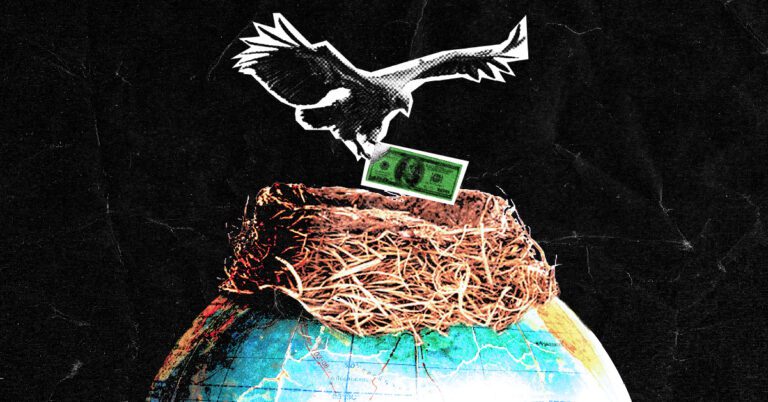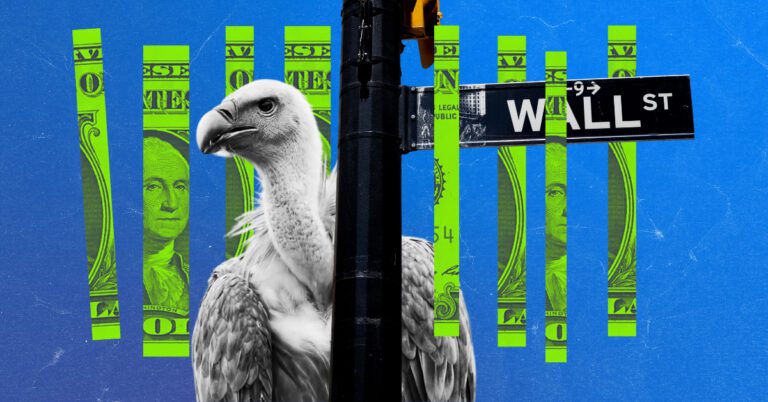Guess who is suing Ecuador, the Democratic Republic of Congo, Puerto Rico, Argentina, and Gambia, and dozens of countries in New York courts? Billionaire investors and their “vulture” hedge funds – called “vultures” because they make their profits by preying on countries in financial distress.
The vulture fund playbook involves buying a struggling country’s debt at a steep discount. Hedge funds refuse to engage in good faith debt negotiations and then block restructuring deals that would help countries recover. These predatory firms often sue countries in New York courts to demand full repayment with interest. After demanding countries slash social services, vulture hedge funds demand enormous payouts at the expense of countries around the world.
Who are the Top Vulture Funds Driving Predatory Debt Practices?
Elliott Management and its subsidiary NML Capital
- Known as the “Doomsday Investor,” billionaire Paul Singer and his firm Elliott Management are notorious for aggressive tactics to extract payouts. During his 15 year battle with the Argetinian government, for instance, he tried to seize the Argentine government’s funds deposited in US and European banks. Singer even convinced the government of Ghana to seize an Argentinian naval warship stationed off the coast of Ghana as collateral.
Aurelius Capital
- Aurelius Capital and founder Mark Brodsky played a pivotal role in pushing austerity measures in Puerto Rico. In 2017, after Puerto Rico filed for bankruptcy, Aurelius and fellow hedge funds filed a complaint demanding repayment on bonds. What did these hedge funds consider “non-essential services” that could be cut to ensure they could cash in? Investments in disaster relief and the Boys and Girls club among other important social spending.
BlackRock
- BlackRock is the world’s largest asset manager and a significant player in sovereign debt. BlackRock became Zambia’s largest known bondholder in 2022 after buying $220 million of government bonds, below face value with high interest rates. BlackRock refused Zambia’s request to suspend debt payments at the height of the pandemic. UK-based Debt Justice estimated BlackRock stood to make a 110% profit on these bonds.
GMO
- GMO invests in distressed debt to extract high profits from struggling economies. In 2020 Ecuador reached a deal with the majority of its bondholders. However, GMO, Contrarian Capital, and a small group of vulture holdouts refused to negotiate. After suing Ecuador in New York courts to block the deal, the government announced austerity measures. This resulted in mass protests and a cost of living crisis, with huge spikes in the cost of bread, cooking oil, and fuel.
When vulture funds engage in legal battles this puts a significant drain on a country’s resources. When countries are caught in limbo with unsustainable debt burdens, over time they can lose access to credit markets, unable to meet even the basic needs of their population. By one estimate, vulture fund lawsuits cost these countries the equivalent of 18% of their spending on healthcare and education alone.
Why are these same hedge funds increasingly cozy with Trump?
Trump’s plans for colossal tax giveaways for the wealthiest 1% and corporations stands to benefit vulture funds and their billionaire founders. Vulture funds are bending to Trump’s will, whether making campaign donations or caving to pressure from the government.
For instance, vulture fund billionaires Paul Singer and Ken Griffin reportedly met with Donald Trump in 2024. Although Singer previously bankrolled an anti-Trump PAC he has since become a donor. According to Open Secrets, Griffin and Singer are two of the largest political donors in US history: Griffin has given $233 million and Singer has given $89 million in federal elections since 2015. In addition to campaign donations, many vulture funds are rolling back previous public commitments on sustainability and socially responsible investing. On the eve of Trump’s inauguration, BlackRock announced it was leaving an environmental sustainability group because of pressure from public officials.
Who is in Vulture hedge fund power player networks?
There are powerful networks of attorneys, lobbyists, and trade groups that enable vulture funds to extract huge profits from struggling countries. This includes:
- Elite Law Firms–like Latham & Watkins, Ropes & Gray, Weil, Gotshal & Manges– that represent vulture funds in their lawsuits to maximize payments from indebted countries
- Wall Street Trade Groups–American Investment Council and the Managed Funds Association–that spend millions of dollars advocating for laws that prioritize vulture fund profits.
- Lobbying and Public Relations Firms–like DCI Group and Venable LLP–paid by vulture funds to influence United States policy and attack countries.
What can we do to stop vulture funds?
Vulture funds’ relentless pursuit of profit over people hurts millions of struggling communities around the world. Unfortunately, New York laws and courts have only enabled this greed, often siding with vulture funds in court and watering down the power of laws already on the books.
Now New York can take a stand and ensure our state’s laws hold predatory vulture funds accountable.
Because around half of sovereign debt contracts are governed by New York law, New Yorkers and their elected officials are uniquely positioned to disrupt the vulture fund playbook.
Lawmakers in the state must take action to end this predatory behavior by passing the following bills:
- Champerty Doctrine (A643 Assm. Gonzalez-Rojas/ S1477 Senator Krueger) – An update of Champerty, a common law doctrine that prohibited an unrelated party from mounting a lawsuit. This provision was weakened in 2004 at the behest of the hedge fund industry, which then opened the floodgates of vulture fund behavior.
- Sovereign Debt Stability Act (S2333 Senator Rivera/ Assm. Dávila) – Often referred to as “the model law,” this legislation provides a statutory pathway to debt restructuring for sovereign bonds in default.
Click here to ensure your representative supports the legislation!
Written By Maggie Corser




